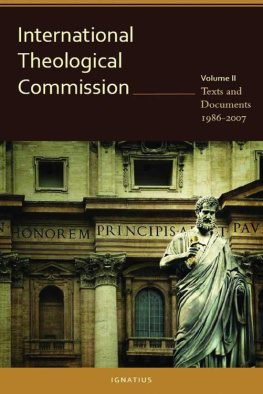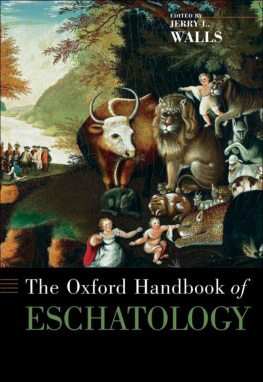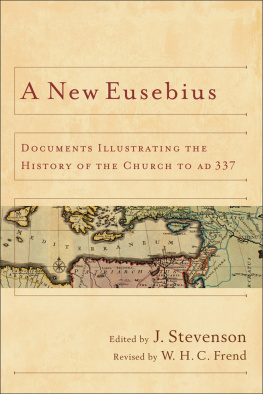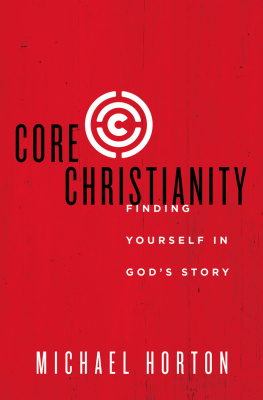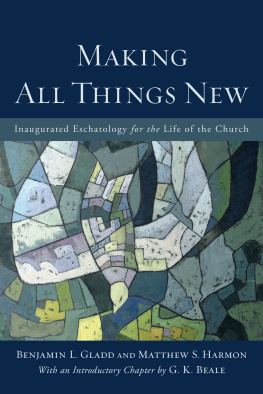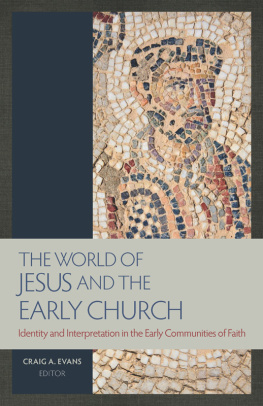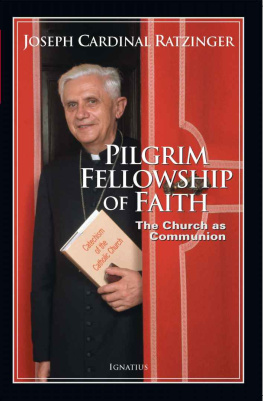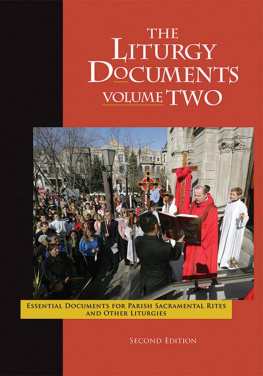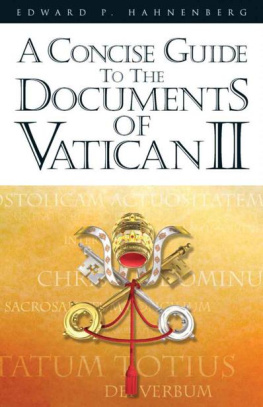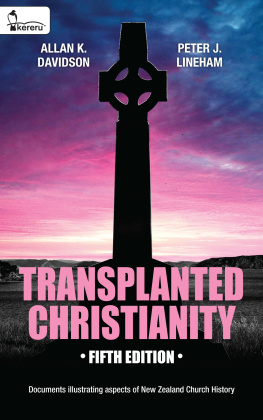Michael Sharkey (editor) - ITC Documents Vol 2
Here you can read online Michael Sharkey (editor) - ITC Documents Vol 2 full text of the book (entire story) in english for free. Download pdf and epub, get meaning, cover and reviews about this ebook. year: 0, genre: Religion. Description of the work, (preface) as well as reviews are available. Best literature library LitArk.com created for fans of good reading and offers a wide selection of genres:
Romance novel
Science fiction
Adventure
Detective
Science
History
Home and family
Prose
Art
Politics
Computer
Non-fiction
Religion
Business
Children
Humor
Choose a favorite category and find really read worthwhile books. Enjoy immersion in the world of imagination, feel the emotions of the characters or learn something new for yourself, make an fascinating discovery.
- Book:ITC Documents Vol 2
- Author:
- Genre:
- Year:0
- Rating:3 / 5
- Favourites:Add to favourites
- Your mark:
- 60
- 1
- 2
- 3
- 4
- 5
ITC Documents Vol 2: summary, description and annotation
We offer to read an annotation, description, summary or preface (depends on what the author of the book "ITC Documents Vol 2" wrote himself). If you haven't found the necessary information about the book — write in the comments, we will try to find it.
ITC Documents Vol 2 — read online for free the complete book (whole text) full work
Below is the text of the book, divided by pages. System saving the place of the last page read, allows you to conveniently read the book "ITC Documents Vol 2" online for free, without having to search again every time where you left off. Put a bookmark, and you can go to the page where you finished reading at any time.
Font size:
Interval:
Bookmark:
INTERNATIONAL THEOLOGICAL COMMISSION
TEXTS AND DOCUMENTS, 1986-2007
INTERNATIONAL THEOLOGICAL COMMISSION
TEXTS AND DOCUMENTS
1986-2007
Edited by Reverend Michael Sharkey
and
Father Thomas Weinandy
IGNATIUS PRESS SAN FRANCISCO
Cover photograph by istockphoto/Roberto A. Sanchez
Cover design by Roxanne Mei Lum
Published in 2009 by Ignatius Press, San Francisco
All rights reserved by the International Theological Commission
ISBN 978-1-58617-226-8
Library of Congress Control Number 2007928865
Printed in the United States of America
CONTENTS
Indices
FOREWORD
The International Theological Commission is now in its fortieth year. It was first established by Paul Vl in 1969 at the suggestion of the first Synod of Bishops in 1967. The cooperation between bishops and theologians during the council years had been so successful that many bishops wanted that cooperation to continue in an institutionalised manner. Suggestions for nominations to the membership of the Commission are sent in by Episcopal Conferences throughout the church. Thirty are then chosen and appointed for a period of five years. They are drawn from all over the world, represent the various branches of theology, and, indeed, the various approaches to theology. They are served by a General Secretary, and the Commissions President is ex officio the Prefect of the Congregation for the Doctrine of the Faith.
The Commission meets annually for a weeks plenary assembly, whether to choose a new topic, advance one in progress, or to finalise it. Work on a topic is usually delegated to a sub-commission whose members share their draft texts (by email these days) and who meet on an ad hoc basis to improve and polish them. When the text is finalised, all the members vote on it: if it receives an absolute majority and is approved by the Prefect, it is published in specific form, which means that it can be taken as an authoritative presentation of the state of the question examined, even if some individual members would have liked to have gone further, but agree to the consensus; however, the Commission reserves the right to approve the text only in generic form, accepting the principal ideas of the document, the rest remaining the responsibility of individual author(s).
The theological method employed by the Commission is largely the one that emerged in Vatican II. Prior to the Council, students of theology were presented with theses explaining the teaching of the Church, illustrated by proof texts from the Scriptures. For example in the 1950s, students in Rome, following a four year course for a licence in theology (S.T.L.), completed the whole of moral theology at the end of the second year before even opening the Bible at the beginning of the third.
The Council changed all that. Sacred Scripture comes first: studied reverently, systematically and critically (in the academic sense); then the historical development so that the student can grasp the import of a decision or an idea in its historical context. In this way a student appropriates the teaching of the Magisterium in a more profound manner. This is now the norm. It is what we expect; and it is what we get in the documents of the International Theological Commission.
Monsignor Michael Sharkey.
Lichfield, U.K., 18 October 2008.
FAITH AND INCULTURATION
INTRODUCTION
1. The International Theological Commission has had, on several occasions, the opportunity to reflect on the relationship between faith and culture.
2. Today the International Theological Commission intends to continue this reflection in a more profound and systematic manner on account of the importance assumed by this theme of the inculturation of faith throughout the Christian world and on account of the insistence with which the Churchs magisterium has considered this theme since the Second Vatican Council.
3. The basis is furnished by the Conciliar documents and by the synod papers which have continued them. Thus, in the constitution Gaudium et spes, the council has shown what lessons and what tasks the Church has drawn from its first experiences of inculturation in the Greco-Roman world.
4. Pope John Paul II himself has taken to heart in a special manner the evangelization of cultures: In his view, the dialogue of the Church and of cultures assumes a vital importance for the future of the Church and of the world. To assist him in this great work, the Holy Father has created a specialized curial body: the Pontifical Council for Culture. It is moreover with this dicastery that the International Theological Commission is happily in a position to reflect today on the inculturation of faith.
5. Relying on the conviction that the incarnation of the Word was also a cultural incarnation, the pope affirms that cultures, analogically comparable to the humanity of Christ in whatever good they possess, may play a positive role of mediation in the expression and extension of the Christian faith.
6. Two essential themes are bound up with this view. First, that of the transcendence of revelation in relation to the cultures in which it finds expression. The Word of God cannot, in effect, be identified or linked in an exclusive manner with the elements of culture which bear it. The Gospel quite often demands a conversion of attitudes and an amendment of customs where it establishes itself: Cultures must also be purified and restored in Christ.
7. The second major theme of the teaching of John Paul II revolves around the urgency of the evangelization of cultures. This task presupposes that one would understand and penetrate with a critical sympathy particular cultural identities and that, in the interest of a universality corresponding to the truly human reality of all cultures, one would favor exchanges between them. The Holy Father thus bases the evangelization of cultures on an anthropological conception firmly rooted in Christian thought since the fathers of the Church. Since culture, when pure, reveals and strengthens the nature of man, the Christian impregnation presupposes the surpassing of all historicism and relativism in the conception of what is human. The evangelization of cultures should therefore be inspired by the love of man in himself and for himself, especially in those aspects of his being and of his culture which are being attacked or are under threat.
8. In the light of this teaching, and also of the reflection which the theme of the inculturation of faith has aroused in the Church, we first propose a Christian anthropology which situates, one in relation to the other, nature, culture and grace. We shall then see the process of inculturation at work in the history of salvation: in ancient Israel, in the life and work of Jesus and in the early Church. A final section will treat problems at present posed to faith by its encounter with popular piety, with non-Christian religions, with the cultural traditions in the young Churches and finally with the various characteristics of modernity.
I. NATURE, CULTURE AND GRACE
1. Anthropologists readily return to describe or define culture in terms of the distinction, sometimes even opposition, between nature and culture. The significance of this word nature varies moreover with the different conceptions of the natural sciences, of philosophy and of theology. The magisterium understands this word in a very specific sense: The nature of a being is what constitutes it as such, with the dynamism of its tendencies toward its proper ends. It is from God that natures possess what they are, as well as their proper ends. They are from that moment impregnated with a significance in which man, as the image of God, is capable of discerning the creating hand of God.
2. The fundamental inclinations of human nature, expressed by natural law, appear therefore as an expression of the will of the Creator. This natural law declares the specific requirements of human nature, requirements which are significative of the design of God for his rational and free creature. Thus all that misunderstanding is avoided which, perceiving nature in a univocal sense, would reduce man to material nature.
Next pageFont size:
Interval:
Bookmark:
Similar books «ITC Documents Vol 2»
Look at similar books to ITC Documents Vol 2. We have selected literature similar in name and meaning in the hope of providing readers with more options to find new, interesting, not yet read works.
Discussion, reviews of the book ITC Documents Vol 2 and just readers' own opinions. Leave your comments, write what you think about the work, its meaning or the main characters. Specify what exactly you liked and what you didn't like, and why you think so.

